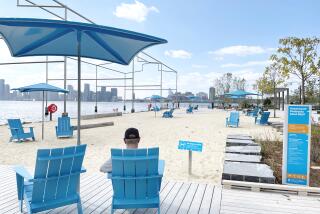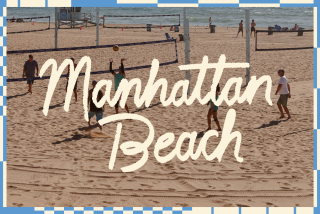Expert anglers will try to hook youngsters on the joy of fishing.
There’s a sign that says “No Fishing” beside the big, muddy pond at Polliwog Park in Manhattan Beach.
But it’s OK to disregard it for a few hours Saturday if you’re a kid between the ages of 6 and 12.
“That’s the one exception” to the no-fishing rule, said Mechele Lanhan, a Manhattan Beach Recreation Department playground leader who will help put on Polliwog’s annual free “Fishing Clinic and Contest.”
Expert anglers will show youngsters how to bait hooks, tie strong knots that will prevent hooks from getting lost in a fish and cast for distance and accuracy. Those who are most skilled at casting as well as those who hook the biggest fish will win fishing equipment.
Of course, actually catching catfish and carp from the well-stocked pond will provide much of the day’s excitement.
“It’ll be a blast,” said Lanhan. “There are enough fish in there that most do catch at least one.”
Last year, she said, one child caught a 13-inch catfish. “But that wasn’t as big as the carp that got away,” she added. “He was huge.”
Lanhan, who developed her own angling skills fishing lakes as a teen-ager, said the city holds the clinic “to encourage children to enjoy the outdoors and learn new recreation skills.” It was started by Howard Carr, 83, of Torrance, who expects to be there, along with the expert anglers he recruits for his American Youth Fishing Program.
During the morning, kids also get an informal ecology lesson about keeping the pond--which gets its share of castoff soft drink cups and plastic bags--clean. “This is where the ducks and the fish live,” said Lanhan. “They can’t leave.”
A couple of young clinic veterans, who lake and ocean fish with their families, say they’ve picked up a few good pointers. When a fish is hooked, said Joshua Shriber, giving the line a pull and lifting it a little helps ensure that your fish doesn’t become another that gets away.
“Never reel in a fish really hard, and always keep your eye on the hook when you’re casting,” added Charles Askov, who won a prize at one clinic for landing an eight-inch catfish.
Lanhan said casting is the hardest thing for youngsters to learn. “There’s a lot of eye-hand coordination going on,” she said. “You have to learn to direct the line. Some don’t understand this and just let the pole fly. They get anxious.”
They also tend to lose fish they’ve hooked because they reel their lines in too fast. Catfish and carp are slow and have to be treated gently. “The kids get excited and pull the hooks out of their mouths,” Lanhan said.
Parents are welcome to come and help with the instruction, which will take place in small groups around the edge of the pond. Young fishermen are asked to bring their own rods and reels, although a few will be available on loan. Bait will be provided.
And no fish will be asked to sacrifice its life so a child can become a better fisherman. Small hooks are used and all fish are thrown back.
“The thrill of the day for these kids is when they get a nibble.” said Lanhan.
But Askov said the nibble isn’t always from a fish: “One time, I pulled out a big Army boot.”
More to Read
Sign up for The Wild
We’ll help you find the best places to hike, bike and run, as well as the perfect silent spots for meditation and yoga.
You may occasionally receive promotional content from the Los Angeles Times.





